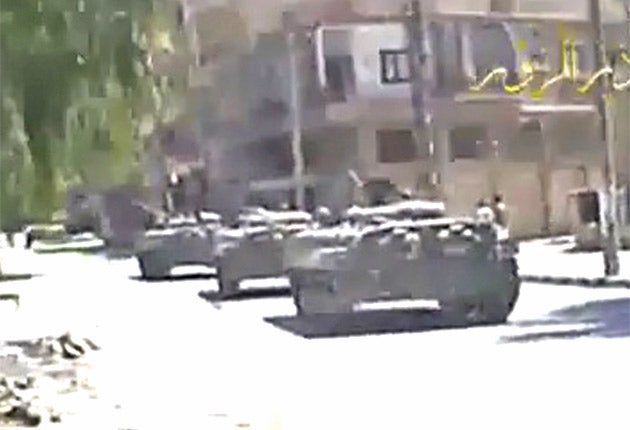Syria's isolation grows after taking control of siege cities

Your support helps us to tell the story
From reproductive rights to climate change to Big Tech, The Independent is on the ground when the story is developing. Whether it's investigating the financials of Elon Musk's pro-Trump PAC or producing our latest documentary, 'The A Word', which shines a light on the American women fighting for reproductive rights, we know how important it is to parse out the facts from the messaging.
At such a critical moment in US history, we need reporters on the ground. Your donation allows us to keep sending journalists to speak to both sides of the story.
The Independent is trusted by Americans across the entire political spectrum. And unlike many other quality news outlets, we choose not to lock Americans out of our reporting and analysis with paywalls. We believe quality journalism should be available to everyone, paid for by those who can afford it.
Your support makes all the difference.The Syrian regime refused yesterday to yield to intense international pressure to cease its attacks on civilians, taking full control of two key cities that have been under siege for days.
The eastern city of Deir el-Zour, which since Sunday has been subjected to a barrage of artillery and machine gun fire, fell to government troops. Footage uploaded onto YouTube showed makeshift graveyards being built in public parks. Concrete blocks marked off mud-filled burial plots and the names of the dead were written in pen on wooden boards sunk in to the tombs. It was not possible to verify the the footage.
Meanwhile, the few journalists that have been given permission to operate in Syria since the start of the uprising against President Bashar al-Assad's autocratic rule in March were taken to Hama yesterday to demonstrate that the government had finally overrun the opposition stronghold. "We have finished a delicate operation in which we eradicated terrorists' hideouts," an army officer told the Associated Press.
During last week's siege, witnesses gave a very different account of the situation, telling how the government shelled residential areas and snipers deployed on the rooftops, killing up to 250 people. Hama was the scene of a 1982 massacre by President Bashar al- Assad's father, when at least 10,000 people were killed.
A resident of Hama who spoke to The Independent by phone yesterday confirmed that Syrian tanks had indeed left the city but added that dozens of checkpoints had been set up by members of the 'shabiha', or 'ghosts', militia – a paramilitary force loyal to the government, which has been accused by activists of killing hundreds of civilians.
The eyewitness, who did not want to be named, said: "They have lists of names. If a protester is wanted by the government, his name is on the list. If they catch you, they will take you away and torture you."
Reports last night also suggested that up to 11 civilians had been killed during a government attack on Homs.
In the clearest indication yet that President Assad has decided to ignore a raft of international condemnation, including in recent days from Saudi Arabia, other Arab states and Turkey, government troops stepped up attacks on villages in the north of the country close to the Turkish border.
Activists said that one woman was killed and 13 people wounded when Syrian tanks rolled into the village of Sarmin, about 18 miles from the border. The fresh barrage came just a day after Turkey's foreign minister lambasted the Syrian regime for the continued aggression.
Ahmet Davutoglu had on Tuesday urged the Syrian leader to rein in the attacks on protesters, which human rights groups say have now killed more than 2,000 civilians. According to Syria's state news agency, President Assad told Mr Davutoglu that military operations would continue so long as national security was at stake. Syria would "not relent in pursuing the terrorist groups in order to protect the stability of the country and the security of the citizens," he was quoted as saying.
Yet in an announcement yesterday, the Turkish prime minister, Recep Tayyip Erdogan, attempted to give the impression that the withdrawal of troops from Hama showed that Syria was heeding Ankara's call for restraint. Mr Erdogan said that Turkey, previously a key ally of Syria with strong trade links to the country's business elite, expected the Baathist regime to begin political reforms within the next 15 days.
"Let's hope that this development results positively and that within 10 or 15 days the process is completed so that steps toward reforms are taken in Syria," Mr Erdogan said.
Any hope that the regime might harbour for rapprochement with the West was scotched last night, however, when the White House said Syria would be better off without President Assad and the US plans to keep pressure on the Syrian government. The US treasury department had earlier announced new sanctions on Syria aimed at the financial infrastructure helping to hold up the government.
Subscribe to Independent Premium to bookmark this article
Want to bookmark your favourite articles and stories to read or reference later? Start your Independent Premium subscription today.
Join our commenting forum
Join thought-provoking conversations, follow other Independent readers and see their replies
Comments